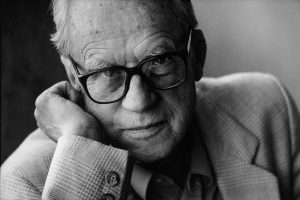Kwame Anthony Appiah in the New York Review of Books:

Michael Young was an inconvenient child. His father, an Australian, was a musician and music critic, and his mother, who grew up in Ireland, was a painter of a bohemian bent. They were hard-up, distractible, and frequently on the outs with each other; Michael, born in 1915 in Manchester, soon found that neither had much time for him. Once when his parents had seemingly forgotten his birthday, he imagined that he was in for a big end-of-day surprise. But no, they really had forgotten his birthday, which was no surprise at all. He overheard his parents talk about putting him up for adoption and, by his own account, never fully shed his fear of abandonment.
Everything changed for him when, at the age of fourteen, he was sent to an experimental boarding school at Dartington Hall in Devon. It was the creation of the great progressive philanthropists Leonard and Dorothy Elmhirst, and it sought to change society by changing souls. There it was as if he had been put up for adoption, because the Elmhirsts treated him as a son, encouraging and supporting him for the rest of their lives. Suddenly he was a member of the transnational elite: dining with President Roosevelt, listening in on a conversation between Leonard and Henry Ford.
Young, who has been called the greatest practical sociologist of the past century, pioneered the modern scientific exploration of the social lives of the English working class. He didn’t just aim to study class, though; he aimed to ameliorate the damage he believed it could do.
More here.
